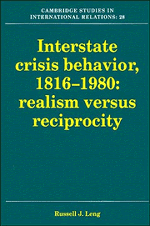Book contents
- Frontmatter
- Contents
- List of figures
- List of tables
- Preface
- 1 REALIST AND PSYCHOLOGICAL PERSPECTIVES
- 2 METHODOLOGY
- 3 THE CRISIS STRUCTURE AND WAR
- 4 PATTERNS OF BEHAVIOR
- 5 STRUCTURE, BEHAVIOR, AND OUTCOMES
- 6 INFLUENCE TACTICS
- 7 INFLUENCE STRATEGIES
- 8 RECIPROCATING INFLUENCE STRATEGIES
- 9 SUMMARY AND CONCLUSION
- EPILOGUE: THE 1990–1991 CRISIS IN THE PERSIAN GULF
- Appendices
- Notes
- References
- Index of names
- Index of subjects
- Titles in the series
1 - REALIST AND PSYCHOLOGICAL PERSPECTIVES
Published online by Cambridge University Press: 05 February 2010
- Frontmatter
- Contents
- List of figures
- List of tables
- Preface
- 1 REALIST AND PSYCHOLOGICAL PERSPECTIVES
- 2 METHODOLOGY
- 3 THE CRISIS STRUCTURE AND WAR
- 4 PATTERNS OF BEHAVIOR
- 5 STRUCTURE, BEHAVIOR, AND OUTCOMES
- 6 INFLUENCE TACTICS
- 7 INFLUENCE STRATEGIES
- 8 RECIPROCATING INFLUENCE STRATEGIES
- 9 SUMMARY AND CONCLUSION
- EPILOGUE: THE 1990–1991 CRISIS IN THE PERSIAN GULF
- Appendices
- Notes
- References
- Index of names
- Index of subjects
- Titles in the series
Summary
The problem of war lies at the heart of the study of international relations. We continue to study war in the hope that greater knowledge will help us to eliminate it, yet, in the face of its continuing recurrence, we must admit to knowing too little about war's causes, and less about its prevention.
One of the things we do know is that almost all wars are preceded by militarized crises, that is, disputes in which the conflict between the two sides has escalated to a level where both sides have indicated a willingness to go to war to achieve, or to defend, their interests. What I will call a “militarized interstate crisis” is the last stop on the road to war, the station at which questions of war and peace hang in the balance. How states respond to militarized crises, and how they ought to respond if they wish to protect their vital interests without the costs of war, are questions that have been asked about specific crises since the advent of the modern state system, at the Congress of Vienna, in 1816.
The first question is descriptive. We do not have much empirically based information on how states – not particular states, but states in general – tend to behave in crises. We need to know more about their central tendencies. There also is a predictive component to the question. To ask how states behave in crises leads to more specific questions regarding the conditions under which particular patterns of behavior are most likely to occur.
- Type
- Chapter
- Information
- Interstate Crisis Behavior, 1816–1980 , pp. 1 - 19Publisher: Cambridge University PressPrint publication year: 1993

